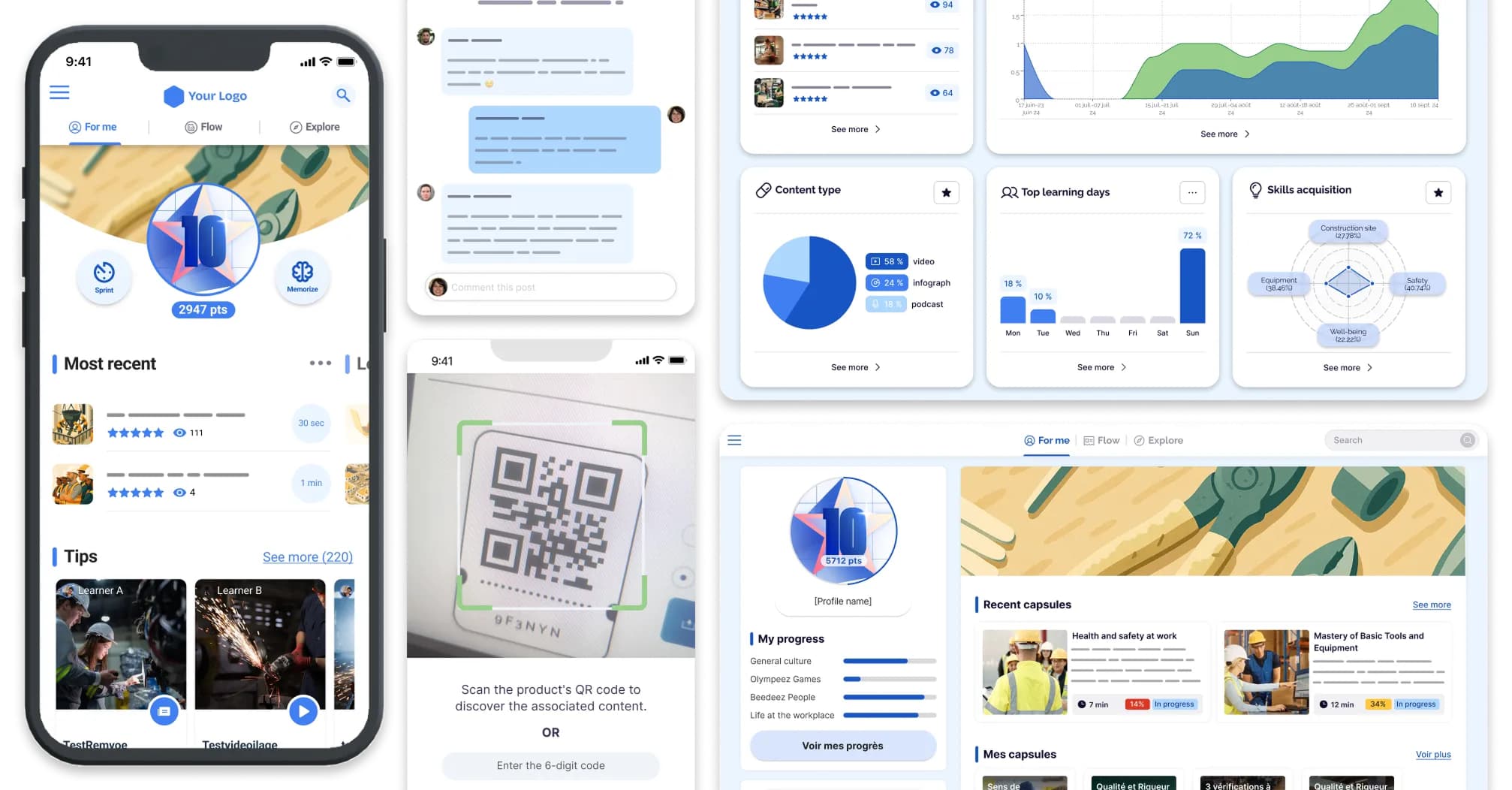In the medical sector, keeping team skills up to date is not an option, but a necessity. With rapid advances in treatments, technologies, and regulatory requirements, it is becoming essential to ensure effective continuing education to ensure patient safety and the quality of care in a hospital, clinic, or health center.
👉 One LMS (Learning Management System) perfectly meets this need, making it possible to train your employees - doctors, nurses, nursing assistants - in a flexible, responsive and standards-compliant manner.
Decryption
According to a study conducted by the American Hospital Association, nearly 60% of medical errors are due to poor mastery of recently implemented techniques or procedures, stressing the need for up-to-date training to ensure patient safety.
→ Continuing education in the health sector is therefore a permanent challenge. Medical practices are changing rapidly, and it is becoming imperative that your teams are constantly updated on the latest advances and standards.
The risk of outdated or poorly followed training can lead to medical errors, a decrease in the quality of care, and regulatory non-compliance.
Integrating an LMS into your training processes is an appropriate response to solve these problems.
Here are the main challenges facing the health sector:
- Rapidly changing practices : Medical techniques, technologies, and regulations change frequently. So staying up to date is critical to providing quality care.
- High workload : Medical teams are often called upon all the time, making it difficult to plan regular face-to-face training.
- Complex logistics : Face-to-face training requires careful organization, which is difficult to reconcile with schedules and staff rotations.
💡 An LMS makes it possible to meet these challenges by ensuring continuous training that is flexible, always up-to-date, and easily accessible to your teams.
What challenges do medical institutions face in keeping skills up to date?
Competency management in the medical sector is particularly complex due to the very nature of the care provided to patients. Here are the main obstacles that institutions face:
Rapidly changing practices, technologies, and regulations
Medical and technological advances are constant. From diagnostic techniques to treatments, medicine is constantly changing.
→ In addition, standards and regulations, such as those related to patient safety, compliance with ISO standards, or health data management, evolve regularly. Keeping your teams trained according to these new requirements is a challenge.
Temporal and organizational constraints
Medical institutions often face a high workload. Health workers, such as doctors and nurses, have tight schedules, making it difficult to schedule regular in-person training.
→ Add to that the difficulty of bringing all the members of a team together at the same time, and you get an organization that does not allow for effective continuing education.
Risks associated with incomplete or outdated training
Poorly updated skills lead to risks for patients, leading to medical errors, management failures, but also legal or regulatory sanctions.
→ It is imperative to avoid these risks, but also to guarantee optimal quality of care.
How does an LMS respond specifically to these challenges?
LMS integration in your institution makes it possible to transform the management of continuing education. Here's how it can respond effectively to the challenges identified above.
Continuously accessible training
An LMS allows your teams to follow online training modules, available at any time, 24/7. Teams can thus follow their training at their own pace, between two consultations or during their breaks, which makes learning much more flexible and adapted to time constraints.
Instant update of educational content
Medical developments and new regulations require regularly updated training. With an LMS, content is updated immediately.
→ As soon as a new standard is introduced or a new technology becomes mainstream, it can be integrated into training modules, ensuring that your employees are always up to date with the latest innovations and requirements.
Personalization of courses
Not all of your staff have the same training needs. An LMS allows you to personalize the courses according to the roles, specialties, and skill levels of each employee.
→ For example, nurses may take modules dedicated to first aid, while doctors will focus on the latest surgical techniques.
Rigorous and automated follow-up
The LMS automatically generates certificates and detailed reports of each module taken. These documents are essential to prove the compliance of your teams during regulatory inspections.
→ This automated follow-up also facilitates the management of certifications and renewals necessary for certain specific skills, such as emergency actions or patient safety.
What are the key functionalities of an LMS to optimize the updating of medical skills?
An LMS offers several powerful features to make continuing education in the healthcare sector even more effective. Here are the most important ones:
Specialized interactive modules
Training modules may include realistic simulations, clinical practice videos, and regular quizzes to test team knowledge. These interactive tools promote learning that is more dynamic and closer to reality.
Mandatory certification courses
Certification paths can be automated to ensure that essential skills, such as emergency actions or patient safety management, are always up to date. The LMS also makes it possible to manage certification renewal deadlines.
Automated alerts
The LMS sends alerts to your team members when they need to renew training, for example on GDPR health regulations or hospital hygiene practices. In this way, you avoid any failure in compliance with standards.
Detailed reporting
Reporting tools allow accurate monitoring of the individual and collective progress of teams. You can track the training courses taken, the performance during the quizzes, and assess the areas where improvements are needed.
The impact of continuing education in the medical sector in 4 essential statistics
- 3 hours per month
On average, a health professional devotes about 3 hours per month to continuing education to stay up to date on practices and new technologies. An LMS makes it possible to make these courses flexible, by integrating into busy schedules. - 78% of medical institutions consider skills management to be a major challenge
According to a study by HealthItNews, nearly 78% of medical institutions report that skills management is a constant challenge, due to rapid changes in the sector and logistical constraints. - 90% reduction in data management errors with GDPR training
A study conducted by the Commission Nationale de l'Informatique et des Libertés (CNIL) reveals that health institutions that have trained their teams in RGPD regulations have reduced errors related to the management of sensitive data by 90%. - 35% performance gain with targeted online training
Data from the EdTech online training platform shows that personalized online training increases the performance of medical teams by 35%, thanks to courses adapted to the specific needs of each employee.
FAQS
Why choose an LMS for the continuing education of medical teams?
An LMS allows you to train your employees at any time, without disrupting their schedule. It also guarantees the rapid updating of content and ensures rigorous monitoring of skills.
Are LMS training courses adapted to professionals who are already experienced?
Yes, an LMS makes it possible to personalize courses according to the experience and needs of each professional, making it an ideal solution even for experienced employees.
How does an LMS ensure compliance with regulations in the healthcare sector?
An LMS provides automated reports, certificates, and detailed monitoring that prove your teams' compliance with current standards. You also have access to renewal alerts to ensure that all certifications are up to date.
Is it possible to train an entire team simultaneously with an LMS?
Yes, an LMS makes it possible to form several teams in parallel, with modules adapted to each specialty. The training courses are accessible simultaneously to all employees, regardless of their schedules.
Is the LMS adapted to the rapid evolution of medical technologies?
Absolutely, an LMS makes it possible to update training courses in real time, thus ensuring that your teams are always trained according to the latest innovations and regulations.




